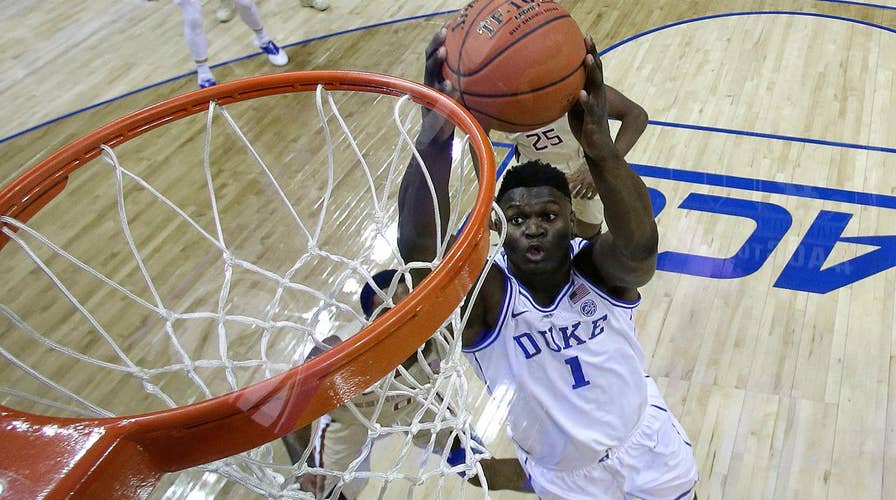March Madness is set to tip-off this week — and if you're an avid college basketball fan, it's time to start wrapping up your bracket picks.
When it comes to filling out brackets, sports fans have a variety of strategies.
Many may go with the top seed, searching for the best odds to win the title. This year, all eyes are on Duke, a 2-1 favorite.
DUKE PICKED AS OVERALL TOP SEED IN MARCH MADNESS
Sports betting leader William Hill US says nearly 20 percent of the money bet on the NCAA Tournament winner over the past year has backed the Blue Devils. Virginia and Gonzaga are each listed at 6-1 odds to win the title, while North Carolina is 8-1. Tennessee, Kentucky and Michigan State are each ranked 12-1 odds, according to the site.
However, others argue that choosing a favored team won't necessarily get you far. Sometimes, the results are completely random. Remember when Middle Tennessee State (a No. 15 ranked seed) defeated Michigan State (a No. 2 seed) back in 2016?
Before you officially put pen to paper this year, here are five things to consider before submitting your picks.
Watch No. 11 seeds
Be careful when deciding just how far a double-digit seed team will go. Some teams may surprise you, especially ones that are ranked No. 11.
If you're looking for a bottom-tiered team to make it far in the tournament, then a No. 11 ranked team may be your best bet.
According to The Ringer, No. 11 teams typically pull the most first-round upsets.
NCAA MARCH MADNESS GAMBLING TOTAL TO HIT $8.5B
"No. 11 seeds, though, have won 43% of the time once they reached the second round," Forbes has pointed out.
Last year, Loyola Chicago (a No. 11 ranked team) made a surprising run when it made it into the Final Four — becoming the fourth 11-seed to make it into the top four since 1985, according to The Washington Post.
Don't go overboard on upsets
In every March Madness tournament, there are bound to be some surprising wins and losses. So, you definitely want to choose some upsets — but don't take it too far.
The NCAA recommends aiming for no more than 16 upsets, which has happened four times in the tournament's history.
"In 27 of the last 34 seasons, there have been between 10 and 16 upsets in the NCAA tournament. The annual average is roughly 12.2. There have been as few as four upsets (2007) and as many as 19 (2014) but the sweet spot is obviously somewhere in between," the NCAA states in a blog post online, citing research from 34 NCAA tournaments since 1985.
If you're not confident in your ability to accurately choose 16 upsets, then the NCAA suggests hitting at least nine.
Don't bet on a No. 16 seed
When it comes to filling out your bracket, understand that the Final Four and the overall winner holds the most weight.
Typically, No. 1 seeds will make it far so you don't want to cut any of them out of the first round. While you may be tempted to throw in a major upset in there (a No. 16 seed team defeating a No. 1 seed team, for example), "just don't," the NCAA says.
"Historically, no team has a better chance to make it to the Final Four or win the championship [than a No. 1 seed]. Don’t jeopardize your bracket for the shot to get one opening-round game right," the NCAA advised in a recent blog post.
According to Bleacher Report, No. 1 seeds beat No. 16 seeds 99.26 percent of the time.
The Associated Press contributed to this report.









































